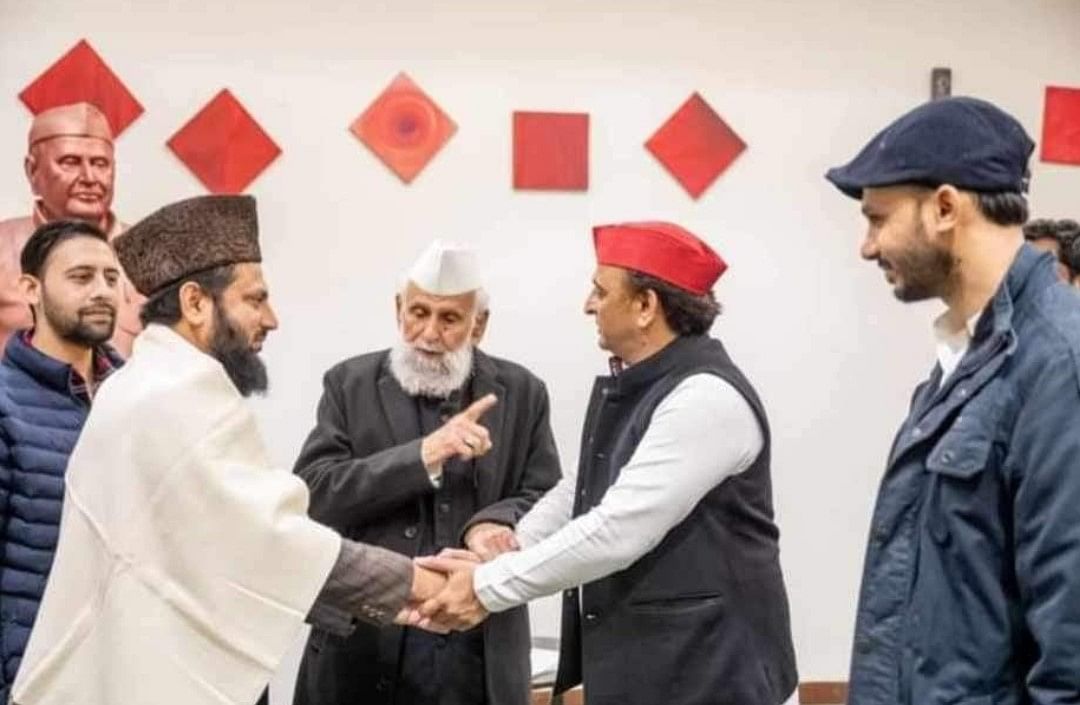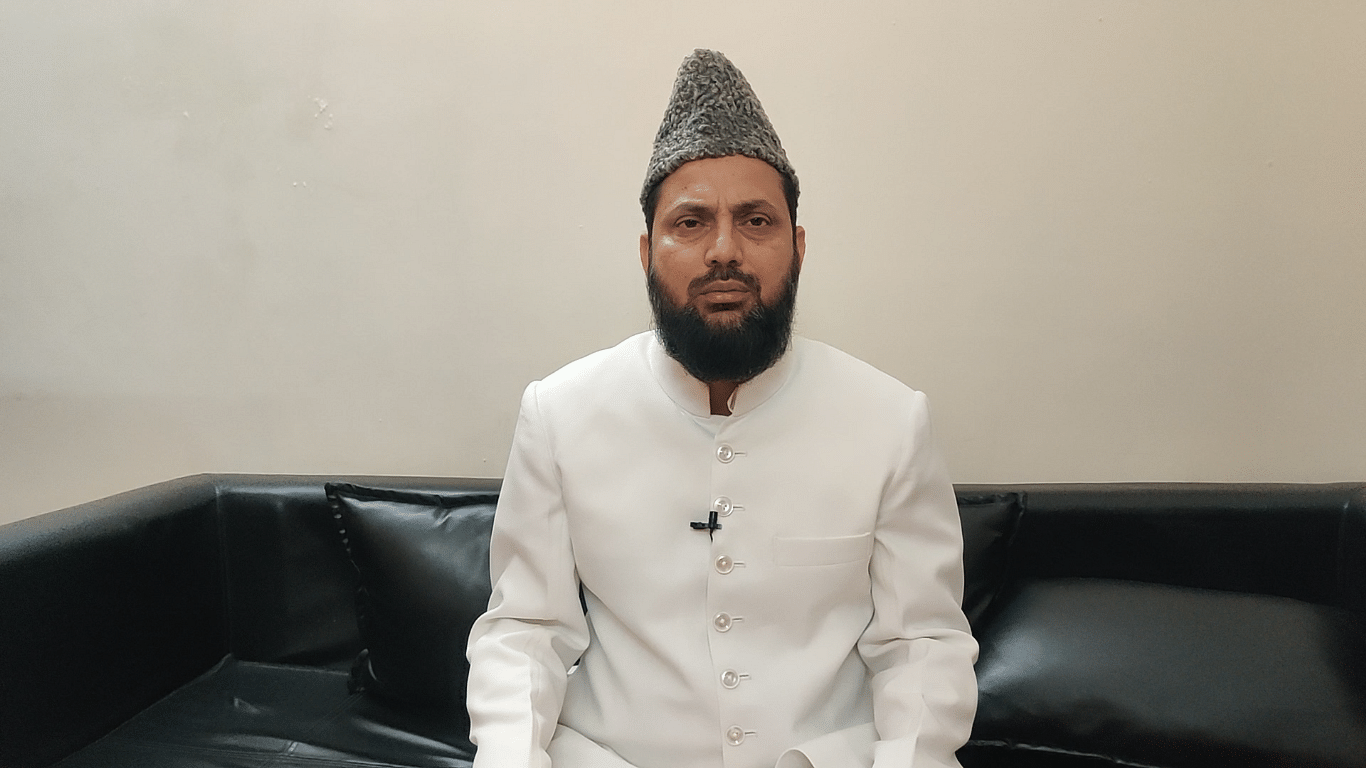
The SP chief’s decision has set off a crisis within the party, with Khan’s supporter accusing the party of parachuting “an outsider” into the seat and announcing Thursday that they would boycott Nadvi’s election campaign.
But for Nadvi, who is originally from Rampur, the matter is settled. “The party’s high command has given me the ticket,” Nadvi, who is now back in Delhi, told ThePrint.
Also Read: How Rampur, Moradabad nominations brought to fore rift within SP’s Muslim leadership
Foray into politics
Born on 1 January, 1976, in Rampur’s Raza Nagar village, Nadvi has a degree in Islamic Studies from Jamia Millia Islamia and a B.Ed degree from Al-Falah University in Faridabad, Haryana. In 2005, the Delhi Waqf Board appointed him as the imam of Jama Masjid, also known as Parliament Masjid.

Although a political greenhorn, Nadvi is no stranger to politicians, having led several, from former President of India A.P.J Abdul Kalam, and BJP ex-MP Shahnawaz Hussain to the late Sambhal MP Shafiqur Rahman Barq, in prayers.
It was, in fact, one of his extensive discussions with SP’s Barq last August that led to his political breakthrough. Nadvi’s views on the condition of India’s minorities, the conflict between Palestine and Israel, and the aggressive stance that Hindu outfits were taking on mosques in India, prompted Barq to suggest that he run for Lok Sabha elections.
“He (Barq) wanted me to take the message of peace to Parliament, but I told him that I don’t want to enter politics,” Nadvi said. “Still, he promised to arrange a meeting with Akhilesh Yadav in Lucknow.”
However, it was an event that occurred days later that changed his mind. The central government issued a notice to reclaim 123 Waqf properties in Delhi. Among these were his Jama Masjid.
This January, Nadvi met Yadav in Lucknow. They were joined by Barq, who encouraged the SP chief to give Nadvi a chance in the Lok Sabha election.
After three more meetings, Akhilesh agreed but Barq had passed away by then.

A non-political face & the Azam Khan factor
Rampur, which will vote in the first phase of the Lok Sabha elections on 19 April, holds special significance not only for the SP but also for the BJP.
According to the 2011 Census, Muslims make up 50.57 percent of the parliamentary constituency while Hindus account for the rest.
For the last four-odd decades, Azam Khan has maintained an iron grip on the area — apart from being a 10-time MLA from the region, he was elected from the parliamentary seat in 2019 but resigned in 2022, when he decided to contest the assembly polls.

In the bypolls held after Khan’s resignation, BJP’s Ghanshyam Singh Lodhi beat the Azam Khan-backed SP candidate Mohd Asim Raja by a margin of 42,192 votes.
The biggest blow, however, came in the assembly bypolls held later that year. That election, prompted by Khan’s disqualification following a three-year jail sentence in a hate speech case, saw BJP’s Akash Saxena beat Raja by over 33,000 votes.
Despite BJP’s victories in the Lok Sabha and assembly polls, Khan continues to wield considerable influence over the area, and for Nadvi, whose demeanor, speech, and behaviour reflect his non-political background, breaking this hold will be a challenge.
The SP appears to have foreseen this predicament. According to Nadvi, Yadav suggested he meet Khan in Sitapur jail, where he’s currently lodged. Meanwhile, the party’s general secretary Shivpal Singh Yadav, too, has been making efforts to appease the Rampur strongman, who had once again pitched Raja for the seat.
Neither leader, however, appears to be in a mood to relent. While Khan’s supporters have already refused to campaign for the cleric, the latter has said he would not go to jail to meet the former MP, instead relying on Yadav to deal with the impasse.
“I have never been to jail,” he said. “I asked him to handle this matter, and he is working on it.”
However, according to Nadvi’s supporters, both Rampur and SP have seen their reputations suffer because of Khan. Close aides claim that there was much discontent against the Rampur strongman in the area.
“Yadav brought Nadvi to control precisely this damage,” one aide said.
Islam, religion, and politics
According to Nadvi, religion and politics must always go together. “Separating them has meant the death of politics,” he said.
Despite his strong views on religion, he treads cautiously on questions about nationalism and communalism, saying that everyone is “entitled to the rights enshrined in the Constitution”.
But he also accuses the BJP government of introducing the Citizenship Amendment Act without due consideration. Religion should never be brought into the question of citizenship, he said.
“BJP has made this law political. They shouldn’t bring religion into it. Citizenship must be given on humanitarian and marginalisation grounds,” Nadvi said, accusing the BJP of using the “confusion” caused by the CAA to divert the public from “real issues”.
Asked what he made of the state of minorities in India, he said: “Forgive those who commit oppression. Do good to those who do evil. Respond to those who bring harm to you with kindness. These are the things that can create a good environment”.
‘Outsider’ Nadvi
Nadvi belongs to the Turk caste — a group that is considered upper caste among Muslims. Of Rampur’s over 1.5 lakh Muslim voters, around 60 percent are upper caste.
In Rampur, Nadvi is up against BJP’s sitting MP Lodhi and BSP’s Zeeshan Khan. However, some Muslim residents are now worried that with two Muslim candidates in the fray, votes will be split between, helping the BJP.

“We don’t want the BJP at all,” Firasat Ali, a five-time former village head from Surajpur, told ThePrint.
At the same time, the perception of his being an “outsider” and a parachute candidate is one he must overcome before the 19 April election. Nadvi, however, is confident of surmounting that hurdle.
“I was born and raised right here on this land. This is my home. It hurts when they call you an outsider. But slowly, they are getting to know me and accepting me as their own,” he said.
His candidature signifies “democracy’s strength,” he said. “I want to bring about a change. Only then will I consider myself successful. All religious people (in Rampur) were waiting for a person who could connect with them. The Almighty has sent me,” Nadvi concludes.
(Edited by Uttara Ramaswamy)
Also Read: End voting rights for Muslims if they aren’t allowed to vote says Azam Khan, alleges harassment

